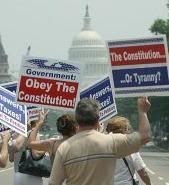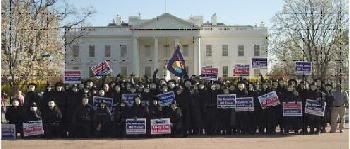Thursday and Friday Ed Brown RBN Radio Shows Now Online At HearLiberty.com

http://www.hearliberty.com/
Scroll down to "Archived Shows".
Friday's guest is Des Griffin author of Fourth Reich of the Rich.
They're talking about the Illuminati.
 We are grateful to the Washington Post, The New York Times, Time Magazine and other great publications whose directors have attended our meetings and respected their promises of discretion for almost forty years....It would have been impossible for us to develop our plan for the world if we had been subjected to the lights of publicity during those years. But, the world is now more sophisticated and prepared to march towards a world government. The supranational sovereignty of an intellectual elite and world bankers is surely preferable to the national auto-determination practiced in past centuries."
We are grateful to the Washington Post, The New York Times, Time Magazine and other great publications whose directors have attended our meetings and respected their promises of discretion for almost forty years....It would have been impossible for us to develop our plan for the world if we had been subjected to the lights of publicity during those years. But, the world is now more sophisticated and prepared to march towards a world government. The supranational sovereignty of an intellectual elite and world bankers is surely preferable to the national auto-determination practiced in past centuries."David Rockefeller - Bilderberg Meeting - June 1991 - Baden, Germany
From David Rockefeller: Memoirs. Page 405.












2 Comments:
Some good cases to study.
Mattox v. U.S., 156 US 237, 243. “We are bound to interpret the Constitution in the light of the law as it existed at the time it was adopted.”
S. Carolina v. U.S., 199 U.S. 437, 448 (1905). “The Constitution is a written instrument. As such, its meaning does not alter. That which it meant when it was adopted, it means now.”
Marbury v. Madison, 5 US 137 “The Constitution of these United States is the supreme law of the land. Any law that is repugnant to the Constitution is null and void of law.”
Murdock v. Penn., 319 US 105 “No state shall convert a liberty into a privilege, license it, and attach a fee to it.”
Shuttlesworth v. Birmingham, 373 US 262 “If the state converts a liberty into a privilege, the citizen can engage in the right with impunity.”
Miranda v. Arizona, 384 U.S. 436 “Where rights secured by the Constitution are involved, there can be no rule making or legislation, which would abrogate them.”
Norton v. Shelby County, 118 U.S. 425 “An unconstitutional act is not law; it confers no rights; it imposes no duties; affords no protection; it creates no office; it is in legal contemplation, as inoperative as though it had never been passed.”
Miller v. U.S., 230 F.2d. 486, 489 “The claim and exercise of a Constitutional right cannot be converted into a crime.”
Brady v. U.S., 397 U.S. 742, 748 “Waivers of Constitutional Rights, not only must they be voluntary, they must be knowingly intelligent acts done with sufficient awareness.”
Cooper v. Aaron, 358 U.S. 1, 78 S.Ct. 1401 (1958). “No state legislator or executive or judicial officer can war against the Constitution without violating his undertaking to support it.”
The constitutional theory is that we the people are the sovereigns, the state and federal officials only our agents." Colten v. Kentucky (1972)407 U.S. 104@122, 92 S.Ct. 1953; Dissent by Douglas
"If the nation comes down from its position of sovereignty and enters the domain of commerce, it submits itself to the same laws that govern individuals therein. It assumes the position of an ordinary citizen and it cannot recede from the fulfillment of its obligations;" 74 Fed. Rep. 145, following 91 U.S. 398.
Before we place the stigma of a criminal conviction upon any such citizen the legislative mandate must be clear and unambiguous. Accordingly that which Chief Justice Marshall has called 'the tenderness of the law for the rights of individuals' [FN1] entitles each person, regardless of economic or social status, to an unequivocal warning from the legislature as to whether he is within the class of persons subject to vicarious liability. Congress cannot be deemed to have intended to punish anyone who is not ‘plainly and unmistakably’ within the confines of the statute. United States v. Lacher, 134 U.S. 624, 628, 10 S.Ct. 625, 626, 33 L.Ed. 1080; United States v. Gradwell, 243 U.S. 476, 485, 37 S.Ct. 407, 61 L.Ed. 857. FN1 United States v. Wiltberger, 5 Wheat. 76, 95, 5 L.Ed. 37.
We do not overlook those constitutional limitations which, for the protection of personal rights, must necessarily attend all investigations conducted under the authority of Congress. Neither branch of the legislative department, still less any merely administrative body, established by Congress, possesses, or can be invested with, a general power of making inquiry into the private affairs of the citizen. Kilbourn v. Thompson, 103 U. S. 168, 196 [26: 377, 386]. We said in Boyd v. United States, 116 U. S. 616, 630 [29: 746, 751]--and it cannot be too often repeated--that the principles that embody the essence of constitutional liberty and security forbid all invasions on the part of the government and its employes of the sancity of a man's home, and the privacies of his life. As said by Mr. Justice Field in Re Pacific R. Commission, 32 Fed. Rep. 241, 250, "of all the rights of the citizen, few are of greater importance or more essential to his peace and happiness than the right of personal security, and that involves, not merely protection of his person from assault, but exemption of his private affairs, books, and papers from the inspection and scrutiny of others. Without the enjoyment of this right, all others would lose half their value."
... It is scarcely necessary to say that the power given to Congress to regulate interstate commerce does not carry with it any power to destroy or impair those guarantees. This court has already spoken fully on that general subject in Counselman v. Hitchock, 142 U. S. 547 [35: 1110], 3 Inters. Com. Rep. 816. ... Suffice it in the present case to say that as the Interstate Commerce Commission, by petition in a circuit court of the United States seeks, upon grounds distinctly set forth, an order to compel appellees to answer particular questions and to produce certain books, papers, etc., in their possession, it was open to each of them to contend before that court that he was protected by the Constitution from making answer to the questions propounded to him; or that he was not legally bound to produce the books, papers, etc., ordered to be produced; or that neither the questions propounded nor the books, papers, etc., called for relate to the particular matter under investigation, nor to any matter which the Commission is entitled under the Constitution or laws to investigate. These issues being determined in their favor by the court, the petition of the Commission could have been dismissed upon its merits.
Interstate Commerce Comm'n v. Brimson (1894), 154 U.S. 447, 38 L.Ed 1047, 1058, 14 S.Ct. 1125.
Carlisle v. United States, 83 U.S. 147, 154 (1873), 'The rights of sovereignty extend to all persons and things not privileged, that are within the territory. They extend to all strangers resident therein; not only to those who are naturalized, and to those who are domiciled therein, having taken up their abode with the intention of permanent residence, but also to those whose residence is transitory. All strangers are under the protection of the sovereign while they are within his territory and owe a temporary allegiance in return for that protection.' "
In Leiberg v. Vitangeli, 70 Ohio App. 479, 47 N.E. 2d 235, 238-39 (1942) "These constitutional provisions employ the word 'person,' that is, anyone whom we have permitted to peaceably reside within our borders may resort to our courts for redress of an injury done him in his land, goods, person or reputation. The real party plaintiff for whom the nominal plaintiff sues is not shown to have entered our land in an unlawful manner. We said to her, you may enter and reside with us and be equally protected by our laws so long as you conform thereto. You may own property and our laws will protect your title. "We, as a people, have said to those of foreign birth that these constitutional guaranties shall assure you of our good faith. They are the written surety to you of our proud boast that the United States is the haven of refuge of the oppressed of all mankind."
Court will assign to common-law terms their common-law meaning unless legislature directs otherwise. People v. Young (1983) 340 N.W.2d 805, 418 Mich. 1.
Common law, by constitution, is law of state. Beech Grove Inv. Co. v. Civil Rights Com'n (1968) 157 N.W.2d 213, 380 Mich. 405.
"Common law" is but the accumulated expressions of various judicial tribunals in their efforts to ascertain what is right and just between individuals in respect to private disputes. Semmens v. Floyd Rice Ford, Inc. (1965) 136 N.W.2d 704, 1 Mich.App. 395.
The common law is in force in Michigan, except so far as it is repugnant to, or inconsistent with, the Constitution or statutes of the state. Stout v. Keyes (1845) 2 Doug. 184, 43 Am. Dec. 465.
"The constitution was ordained and established by the people of the United States for themselves, for their own government, and not for the government of the individual states. Each state established a constitution for itself, and in that constitution, provided such limitations and restrictions on the powers of its particular government, as its judgment dictated. The people of the United States framed such a government for the United States as they supposed best adapted to their situation and best calculated to promote their interests. The powers they conferred on this government were to be exercised by itself; and the limitations on power, if expressed in general terms, are naturally, and, we think, necessarily, applicable to the government created by the instrument. They are limitations of power granted in the instrument itself; not of distinct governments, framed by different persons and for different purposes. If these propositions be correct, the fifth amendment must be understood as restraining the power of the general government, not as applicable to the states."
Sovereignty itself is, of course, not subject to law, for it is the author and source of law; but in our system, while sovereign powers are delegated to the agencies of government, sovereignty itself remains with the people, by whom and for whom all government exists and acts. And the law is the definition and limitation of power. For the very idea that one man may be compelled to hold his life, or the means of living, or any material right essential to the enjoyment of life, at the mere will of another, seems to be intolerable on any country where freedom prevails, as being the essence of slavery itself. See: Yick Wo v. Hopkins , 118 U.S. 356 (1886).
"He is not to substitute even his juster will for theirs; otherwise it would not be the 'common will' which prevails, and to that extent, the people would not govern." See: Speech by Judge Learned Hand at the Mayflower Hotel in Washington, D.C. May 11, 1919, entitled, "Is there a Common Will?"
". . . The Congress cannot revoke the Sovereign power of the people to override itself as thus declared." See: Perry v. United States , 294 U.S. 330, 353 (1935).
"In the United States, Sovereignty resides in the people, who act through the organs established by the Constitution." See: Chisholm v. Georgia , 2 Dall 419, 471; Penhallow v. Doane's Administrators, 3 Dall 54, 93; McCullock v. Maryland, 4 Wheat 316, 404, 405; Yick Wo v. Hopkins , 118 U.S. 356, 370 (1886).
"As men whose intentions require no concealment, generally employ the words which most directly and aptly express the ideas they intent to convey; the enlightened patriots who framed our constitution and the people who adopted it must be understood to have employed the words in their natural sense, and to have intended what they have said." See: Gibbons v. Ogden, 27 U.S. 1
No legislature can bargain away the public health or the public morals. The people themselves cannot do it, much less their servants. See: New Orleans Gas Co v. Louisiana Light Co , 115 U.S. 650 (1885).
People are supreme, not the state. See: Waring v. the Mayor of Savannah, 60 Georgia at 93.
Strictly speaking, in our republican form of government, the absolute sovereignty of the nation is in the people of the nation; and the residuary sovereignty of each state, not granted to any of its public functionaries, is in the people of the state. See: 2 Dall. 471; Bouv. Law Dict. (1870).
The theory of the American political system is that the ultimate sovereignty is in the people, from whom all legitimate authority springs, and the people collectively, acting through the medium of constitutions, create such governmental agencies, endow them with such powers, and subject them to such limitations as in their wisdom will best promote the common good. See: First Trust Co. v. Smith, 134 Neb.; 277 SW 762.
What is a constitution? It is the form of government, delineated by the mighty hand of the people, in which certain first principles of fundamental laws are established." See: Vanhorne's Lessee v. Dorrance , 2 U.S. 304 (1795).
A constitution is designated as a supreme enactment, a fundamental act of legislation by the people of the state. A constitution is legislation direct from the people acting in their sovereign capacity, while a statute is legislation from their representatives, subject to limitations prescribed by the superior authority. See: Ellingham v. Dye, 178 Ind. 336; 99 NE 1; 231 U.S. 250; 58 L. Ed. 206; 34 S. Ct. 92; Sage v. New York, 154 NY 61; 47 NE 1096.
The question is not what power the federal government ought to have, but what powers, in fact, have been given by the people. . . . The federal union is a government of delegated powers. It has only such as are expressly conferred upon it, and such as are reasonably to be implied from those granted. In this respect, we differ radically from nations where all legislative power, without restriction of limitation, is vested in a parliament or other legislative body subject to no restrictions except the discretion of its members. See: U.S. v. William M. Butler , 297 U.S. 1.
The people themselves have it in their power effectually to resist usurpation, without being driven to an appeal in arms. An act of usurpation is not obligatory: It is not law; and any man may be justified in his resistance. Let him be considered as a criminal by the general government; yet only his fellow citizens can convict him. They are his jury, and if they pronounce him innocent, not all powers of congress can hurt him; and innocent they certainly will pronounce him, if the supposed law he resisted was an act of usurpation. See: 2 Elliot's Debates, 94; 2 Bancroft, History of the Constitution, 267.
But it cannot be assumed that the framers of the Constitution and the people who adopted it did not intent that which is the plain import of the language used. When the language of the Constitution is positive and free from all ambiguity, all courts are not at liberty, by a resort to the refinements of legal learning, to restrict its obvious meaning to avoid hardships of particular cases, we must accept the Constitution as it reads when its language is unambiguous, for it is the mandate of the sovereign powers. See: State v. Sutton, 63 Minn. 147, 65 WX N.W., 262, 101, N.W. 74; Cook v. Iverson, 122, N.M. 251.
In this state, as well as in all republics, it is not the legislation, however transcendent its powers, who are supreme--- but the people--- and to suppose that they may violate the fundamental law is, as has been most eloquently expressed, to affirm that the deputy is greater than his principal; that the servant is above his master; that the representatives of the people are superior to the people themselves; that the men acting by virtue of delegated powers may do, not only what their powers do not authorize, but what they forbid. See: Warning v. the Mayor of Savannah, 60 Georgia, P. 93.
There have been powerful hydraulic pressures throughout our history that bear heavily on the court to water down constitutional guarantees and give the police the upper hand. That hydraulic pressure has probably never been greater than it is today. Yet if the individual is no longer to be sovereign, if the police can pick him up whenever they do not like the cut of his jib, if they can "seize" and "search" him in their discretion, we enter a new regime. The decision to enter it should be made only after a full debate by the people of this country. See: Terry v. Ohio, 392 U.S. 39 (1967).
"Personal liberty, or the Right to enjoyment of life and liberty, is one of the fundamental or natural Rights, which has been protected by its inclusion as a guarantee in the various constitutions, which is not derived from, or dependent on, the U.S. Constitution, which may not be submitted to a vote and may not depend on the outcome of an election. It is one of the most sacred and valuable Rights, as sacred as the Right to private property ... and is regarded as inalienable." 16 C.J.S., Constitutional Law, Sect.202, p.987
Sovereignty itself is, of course, not subject to law, for it is the author and source of law; but in our system, while sovereign powers are delegated to the agencies of government, sovereignty itself remains with the people, by whom and for whom all government exists and acts. And the law is the definition and limitation of power. For the very idea that one man may be compelled to hold his life, or the means of living, or any material right essential to the enjoyment of life, at the mere will of another, seems to be intolerable in any country where freedom prevails, as being the essence of slavery itself. (Yick Wo vs. Hopkins, U.S. 356 (1886). "...The Congress cannot revoke the Sovereign power of the people to override their will as thus declared." Perry v. United States, 294 U.S. 330, 353 (1935).
"In the United States, Sovereignty resides in the people, who act through the organs established by the Constitution." Chisholm v. Georgia, 2 Dall 419, 471; Penhallow v. Doane's Administrators, 3 Dall 54, 93; McCullock v. Maryland, 4 Wheat 316, 404, 405; Yick Yo v. Hopkins, 118 U.S. 356, 370.
"The rights of the individuals are restricted only to the extent that they have been voluntarily surrendered by the citizenship to the agencies of government." City of Dallas v Mitchell, 245 S.W. 944
Supreme Court Justice Brandeis spoke, in the case of Olmstead v. United States when he said: "Decency, security and liberty alike demand that government officials shall be subjected to the same rules of conduct that are commands to the citizen. In a government of laws, existence of the government will be imperiled if it fails to obsereve the laws scruplously. Our government is the potent omnipresent teacher. For good or ill, it teaches the whole people by it's example. Crime is contagious. If the government becomes a law breaker, it breeds contempt for the law; it invites every man to become a law unto himself; it invites anarchy. To declare that in the administration of criminal laws the end justifies the means-----to declare that the government may commit crimes in order to secure the conviction of a private criminal----would bring terrible retribution. Against that pernicious doctrine this Court should resolutely set its face. ...And so should every law enforcemnt student, practitioner, supervisor, and adminstrator........."
In this state, as well as in all republics, it is not the legislation, however transcendent its powers, who are supreme--- but the people--- and to suppose that they may violate the fundamental law is, as has been most eloquently expressed, to affirm that the deputy is greater than his principal; that the servant is above his master; that the representatives of the people are superior to the people themselves; that the men acting by virtue of delegated powers may do, not only what their powers do not authorize, but what they forbid. See: Warning v. the Mayor of Savannah, 60 Georgia, P. 93.
There have been powerful hydraulic pressures throughout our history that bear heavily on the court to water down constitutional guarantees and give the police the upper hand. That hydraulic pressure has probably never been greater than it is today. Yet if the individual is no longer to be sovereign, if the police can pick him up whenever they do not like the cut of his jib, if they can "seize" and "search" him in their discretion, we enter a new regime. The decision to enter it should be made only after a full debate by the people of this country. See: Terry v. Ohio, 392 U.S. 39 (1967).
Such as in the case of:
http://www.ca6.uscourts.gov/internet/crim_jury_insts/html/chap1_8.htm
PATTERN CRIMINAL
JURY INSTRUCTIONS
_______________
Chapter 1.00
GENERAL PRINCIPLES
Committee Commentary 1.02
2005 Edition
The Committee made no change in the instruction.
A panel of the Sixth Circuit quoted paragraph (4) of this instruction and stated that it cured any confusing statements made by the district court during voir dire. United States v. Okeezie, 1993 WL 20997 at 4, 1993 U.S. App. LEXIS 1968 at 4 (6th Cir. 1993)(unpublished).
1991 Edition
The jurors have two main duties. First, they must determine from the evidence what the facts are. Second, they must take the law stated in the court's instructions, apply it to the facts and decide whether the facts prove the charge beyond a reasonable doubt. See Sparf v. United States, 156 U.S. 51, 102-107, 15 S.Ct. 273, 39 L.Ed. 343 (1895); Starr v. United States, 153 U.S. 614, 625, 14 S.Ct. 919, 923, 38 L.Ed. 841 (1894).
The jurors have the power to ignore the court's instructions and bring in a not guilty verdict contrary to the law and the facts. Horning v. District of Columbia, 254 U.S. 135, 138, 41 S.Ct. 53, 54, 65 L.Ed. 185 (1920).
But they should not be told by the court that they have this power.
United States v. Krzyske, 836 F.2d 1013, 1021 (6th Cir.), cert. denied, 488 U.S. 832, 109 S.Ct. 89, 102 L.Ed.2d 65 (1988); United States v. Avery, 717 F.2d 1020, 1027 (6th Cir.1983), cert. denied, 466 U.S. 905, 104 S.Ct. 1683, 80 L.Ed.2d 157 (1984); United States v. Burkhart, 501 F.2d 993, 996-997 (6th Cir.1974), cert. denied, 420 U.S. 946, 95 S.Ct. 1326, 43 L.Ed.2d 424 (1975).
They should instead be told that it is their duty to accept and apply the law as given to them by the court. United States v. Avery, supra at 1027.
Post a Comment
Subscribe to Post Comments [Atom]
<< Home